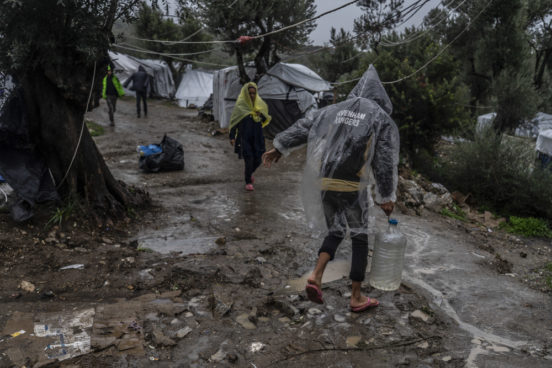Urgent action is required to protect the inhabitants of over-crowded refugee camps in places like Greece from coronavirus
Two things public health experts routinely tell us about Covid-19 are that prevention is better than cure and that this pandemic does not respect geographic boundaries. Neither of these messages is being heeded in the response to refugees and displaced populations.
For the millions of people in official camps and informal settlements, the pandemic poses a terrifying threat that lays bare the inadequacy of current approaches. Take the Cox’s Bazar camp in Bangladesh for example, home to more than 855,000 Rohingya refugees, living in small and confined shelters and where the population density is such that 40,000 people share a single square kilometre. Social distancing there is impossible, and handwashing stations, triage centres, and isolation facilities are lacking.
The dangers are similar the world over, from those internally displaced in Syria and Venezuela, to the recent swelling of numbers of refugees in Idlib province, Al Hol in Syria, the Zaatari camp in Jordan, the Bekaa Valley in Lebanon and Ciudad Juárez in northern Mexico, to name the most obvious. These populations have typically endured the worst of possible hardships, caught infectious diseases and developed respiratory conditions in the course of merely surviving in camps without planned sanitation or access to decent health care. Now add to this few means of Covid-19 prevention, little treatment for those infected and virtually no means of disease control.
Yet it is here, in Europe, that an entirely avoidable catastrophe unfolds. Lacking the most basic sanitation, including soap and clean running water, thousands face a perilous fate, sleeping in close proximity in overcrowded camps that they are prevented from leaving. On the Greek island of Lesvos, once a transit route for those crossing from Turkey, around 20,000 people are squeezed into an unfit makeshift encampment, originally intended for no more than 3,000. The outcome? Roughly one water tap between 1,300 people and entire families made to occupy spaces of little more than three square meters (and the entire population squeezed into less than one-tenth of a kilometre squared).
Increasingly desperate pleas
This means, as Dr Hilde Vochten, Médecins Sans Frontières’ medical coordinator in Greece, makes plain, “recommended measures such as frequent hand washing and social distancing to prevent the spread of the virus are just impossible”. Hence MSF has called on the European Union to work in partnership with Greece to close the camps and resettle people before it is too late.
From the residents of the Moira camp on Lesvos, meanwhile, we hear increasingly desperate pleas that if not all can be evacuated then priority be given to the elderly and vulnerable. Medics on the ground report horrific conditions. Speaking to the British Medical Journal, Siyana Marhroof Shaffi, director of the UK-based charity Kitrinos Healthcare, which runs a medical clinic on Lesvos, says that many of the camp’s residents already have respiratory infections and indeed that, in 21st Century Europe, scabies is “rampant” in these camps.
The situation is no better on the other Aegean islands of Chios, Samos, Leros, and Kos, where formal and informal camps have swelled since the EU-Turkey deal (signed in 2016) commenced to prevent onward movement from the camps.
While this treaty was designed to prevent the movement of asylum seekers into Europe, it was matched by a hardening in approach to those who had already arrived. Typical is the Pyli facility in Kos, an open structure to which thousands have been left to pin makeshift shelters with no organised water, sanitation or prospect of medical provision.
Overall however these are relatively small numbers of people – they run into the tens of thousands in a continent of over 740 million, and so could easily be absorbed if there was a political will to close the camps.
A disease that affects everyone
The call for urgent action however does not need to rest on altruism and goodwill but law: 1951 Refugee Convention insists that asylum-seekers and refugees should not be penalised for having entered or stayed irregularly and, most pressingly in light of Covid-19, the UN High Commissioner for Refugees (UNHCR) has a clear protocol for identifying and addressing vulnerability of asylum seekers and refugees. This is more relevant than ever and must now be heeded.
There are positive lessons we can draw on from elsewhere, including the recent decision of the Portuguese government to treat asylum seekers and refugees in Portugal as permanent residents with access to health care, at least during the present crisis.
The EU could, for example, offer Greece debt relief in the first instance and then partner up with international agencies to help rehome people. There is an appetite to help.
We have seen in recent years how national level intransigence has been thrown into sharp relief by municipal, local or city-level initiatives.
This attitude has an older pedigree in the International Cities of Refuge Network, the Cities of Sanctuary, the Save Me campaign and the Eurocities network, each of which elevates the role of the cities to accommodate refugees.
In all the risk and uncertainty accompanying Covid-19, it is easy to forget safety is a relative concept and so while Covid-19 is a disease that can affect everybody, it will not do so equally.
Whatever else transpires in the coming weeks and months, what remains certain is that these camps are European constructions and all the responsibility for what befalls in them rests not with those who contract this illness, but in the failure of Greek and EU leaders to honour their obligations to the most vulnerable.
This article was originally published in The Scotsman (7 April 2020).
Nasar Meer is professor of race, identity and citizenship, and principal investigator of the research project: the Governance and Local Integration of Migrants and Europe’s Refugees (Glimer)










Comments by